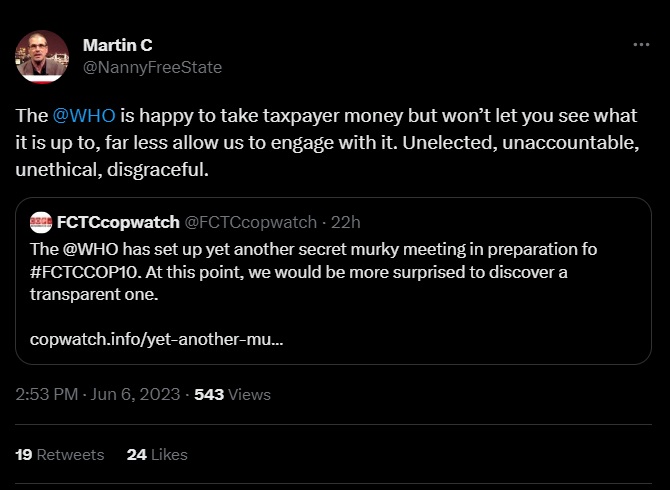Vapers Digest 7th June
Wednesday’s News at a glance:
World Health Organisation exploits tobacco farmers, the hungry, sick and poor in its crude activism ~ W.H.O. boss lies about vaping ~ Yet another murky WHO meeting ~ Vape Pricing Critical If FDA Limits Nicotine in Cigarettes, Study Finds ~ New Approach Demanded ~ Rutgers: Ignorance Remains Rife ~ Smoke Free Sweden Celebrates Swedish Success ~ Is Industry to Blame for Teen Substance Use? ~ New Zealand to introduce new rules to crack down on youth vaping ~ Expert comments on whether disposable vapes should be banned ~ South Africa Taxes Vapes Before Passing Product Regulations ~ Prime Minister Chris Hipkins, Health Minister Ayesha Verrall speak at post-Cabinet press conference
World Health Organisation exploits tobacco farmers, the hungry, sick and poor in its crude activism
Clive Bates, The Counterfactual
Yet another murky WHO meeting
COPWatch
Copwatch has often referred to the opaque nature of the WHO’s Conference of the Parties meetings. It is fully expected that the COP10 meeting in Panama will follow the same path of operating behind closed doors, as best described in this briefing from 2021.
“Also excluded are advocacy NGOs representing people directly affected by tobacco control regimes. This includes smokers and users of safer nicotine products. The involvement of the tobacco industry in the production of some but by no means all safer nicotine products means that advocacy organisations in favour of tobacco harm reduction, including numerous vaping or snus consumer advocacy organisations, are excluded de facto.”
Vape Pricing Critical If FDA Limits Nicotine in Cigarettes, Study Finds
Ben Adlin, Filter
Moves by regulators to limit the nicotine content of cigarettes would encourage people to buy full-nicotine cigarettes from illegal sources, according to a new study by researchers at Johns Hopkins University. But the availability of affordable vape products, the paper also suggests, would curb that migration to the illicit market.
In June 2022, the Biden administration announced a proposal to “establish a maximum nicotine level to reduce the addictiveness of cigarettes and other combusted tobacco products,” The US Food and Drug Administration (FDA) has authority to set nicotine limits under the 2009 Tobacco Control Act.
Three From Dave Cross, Planet Of The Vapes
New Approach Demanded
Members of the European Parliament, together with consumer activists, called for a more open approach towards harm reduction in the EU. World No Tobacco Day took place on May 31 and was a reminder that traditional anti-smoking policies are not working anymore. Eight million deaths worldwide due to smoking should be reason enough to rethink traditional approaches and learn from countries that successfully reduced smoking rates, like Sweden.
Rutgers: Ignorance Remains Rife
Rutgers University has conducted a survey looking at attitudes towards vape products and discovered that ignorance about vaping facts remains worryingly high. “About half of cigarette smokers and young adult non-smokers think that nicotine-based [vapes] have the same amount or even more harmful chemicals than regular cigarettes,” the team says.
Smoke Free Sweden Celebrates Swedish Success
On World No Tobacco Day, leading global health experts delivered the landmark report “The Swedish Experience: A roadmap for a Smoke Free society” to key Members of the European Parliament. This launch marked a potential momentous turning point in the fight against tobacco and Sweden’s last World No Tobacco Day before becoming smoke free.
Is Industry to Blame for Teen Substance Use?
Dr. Brad Rodu, Tobacco Truth
I’m a member of a tobacco policy discussion group that has focused many times on the so-called epidemic of teen vaping. One recent exchange centered on how e-cigarette and vape manufacturers and retailers might demonstrate to government regulators and policymakers that they are serious about not marketing their products to children. Frankly, I take issue with the underlying assumption that the industry is actually responsible for teen behaviors.
New Zealand to introduce new rules to crack down on youth vaping
Tess McClure, The Guardian
New Zealand is cracking down on youth vaping, with new rules to try to curb growing numbers of teens taking up the habit.
The government announced on Tuesday it would be banning most disposable vapes, not allowing new vape shops near schools and enforcing generic flavour descriptions – so more evocative descriptors like “strawberry jelly doughnut” would become “berry”.
Visit Nicotine Science & Policy for more News from around the World









